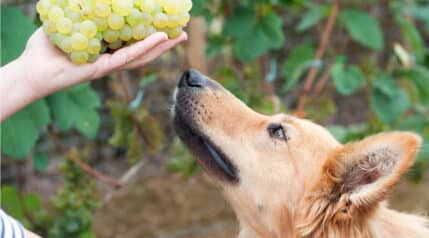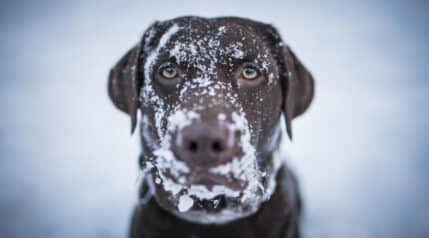Poodles come in three sizes: Standard, Miniature, and Toy. No matter what size you have, they all have the same coat. So this guide is a must-read for all current or soon-to-be pup parents. Poodles are known for their fun nature, intelligent minds, and loving personality. But most of all, they are renowned for their desirable, curly coats.
Poodles are classified as a hypoallergenic dog breed, meaning they are low-shedding dogs. Unfortunately, there is no such thing as a dog that doesn’t shed unless, of course, they are hairless. Despite Poodles being low shedders, there are still things you need to know to manage their coat and shedding.
In addition to answering the question ‘how much do Poodles shed,’ we also explore the makeup of their coat. Plus, we look at what time of year they shed the most, how to manage the coat, and much more. So, let’s comb through the details on this fancy Fido and its glamorous fur coat.
Poodle Coats

Despite having a reputation as a non-shedder, this is not the case. Poodles have a single-layered coat, meaning they do not have an underlayer of soft, downy fur. Those allergic to dog hair are usually allergic to this part of the coat, also known as dander. Because Poodles have much less dander than other dogs, this makes them more tolerable for allergy sufferers.
Their coat is more similar to human hair than other dogs’ fur. Poodles also have a dense, wavy, or curly coat. So when they do shed, the hair falls into the coat rather than falling out. And it won’t usually come out until you brush it out, which is why a Poodle home is relatively hair-free compared to that of a Siberian Husky.
Poodle Colors
The Poodle family is a colorful bunch, and they sport pretty much all the colors of the doggy coat rainbow. The only color not found in the Poodle bloodline is merle. Regardless of what shade a Poodle favors, they pretty much all shed the same and require the same level of grooming. The only difference comes, say, if you have dark décor and a light-colored Poodle. Then you might notice more hair than if you had a dark-colored Poodle.
Poodle Shedding Frequency
Poodles do not shed seasonally like many other dog breeds, so they won’t “blow their coat” when the seasons change. Instead, their hair continuously grows and falls out steadily over the year, which is another reason why you’ll hardly notice a Poodle shedding. Of course, if you are worried about the amount of hair in your home, you’ll see more hair from a Standard Poodle than a Toy Poodle simply because there’s more of it.
Hypoallergenic Dogs
Because Poodles are low-shedders, they find themselves on the list of hypoallergenic dogs. Hypoallergenic dogs are less likely to cause an allergic reaction in dog allergy sufferers. But it is not just the dander that causes allergies. Saliva and proteins in the urine are also allergens.
Dander is not just a Poodle’s hair; it is the mixture of hair, dead skin, coat oils, and dust. All dogs have this, just like all dogs produce saliva and urine. This is why there is no such thing as a totally hypoallergenic dog. Sure, Poodles release less of these allergens, but they still stick to clothes, furniture, and walls.
If you wonder whether Poodles might be the answer to owning a dog without triggering your allergies, you could be right. But it would be best if you spent time with various Poodles before welcoming one into your home and hoping for the best. Some allergy sufferers still find living with them intolerable.
Other Reasons For Losing Hair

Thankfully, because Poodles don’t shed as much as other dogs, it’s easier to spot when hair loss becomes a concern. All Poodles are different, so you need to learn what is normal for your dog. Here are some of the reasons why Poodles might suffer from losing hair:
- Stress: Poodles are sensitive dogs that pick up on human stress. This often occurs when your family or home is undergoing significant change, your dog is experiencing a change in diet or lifestyle, or something as simple as a crate move.
- Pregnancy: When a mother’s hormones change, one of the effects could be additional hair loss. This reason is not usually anything to worry about, and it should return to normal after the litter arrives and her hormones settle.
- Allergies, Infections, or Parasites: If Poodles suffer from an allergy, have a skin infection, or parasites, they will probably lose hair. It usually occurs in patches concentrated around the affected area. You may also see open sores or dry and itchy skin, sometimes accompanied by a strong odor.
- Sebaceous Adenitis: This is a genetic health disorder found in Poodle’s bloodline. It is more likely to affect Standard Poodles. This disorder causes inflammation in the oil-producing sebaceous glands in the skin, which causes hair to fall out. It can also cause cysts but do not try to drain these yourself as it can spread infection.
- Cushing’s Disease: Poodles are predisposed to something called Cushing’s disease. It is caused by the overproduction of a hormone known as cortisol. Cortisol helps dogs respond to stress, fight infection, manage weight, and control blood sugar levels. A symptom of Cushing’s disease is a loss of the coat’s hair.
If you notice any significant increase in the amount of hair when Poodles shed, you must take them to the vet for a check-up. A professional should establish the underlying cause of excessive coat shedding rather than assume it’s due to stress or something you already know about.
Managing Poodle’s Shedding

Sure, Poodles are a low-shedding breed, but they still have a high maintenance coat that needs a grooming schedule to manage. Here are the best ways to manage their coat and reduce shedding.
Brushing
The hair they lose falls back into the coat and waits for you to brush it out. The more you brush, the less likely you are to find it on the sofa. Plus, their curls need brushing to prevent matting and tangling. And brushing also helps to stimulate blood circulation, which in turn encourages a healthy coat. Poodles need brushing at least every other day, but daily is better.
Types Of Brushes
Using the right tools can be the difference between an effective brushing session and a poor one. A slicker brush, or a pin brush, is the best grooming tool to manage their coat. Because Poodles do not have an undercoat, their skin is more sensitive. So invest in a slicker or pin brush with softer ends. Additionally, a comb is ideal for brushing the hair around sensitive areas, such as the face or eyes, and completing the curly look that Poodles should have.
Shampoo
Using the correct shampoo is another way to manage their shedding successfully. If you use a product that doesn’t agree with their skin, they could lose even more hair. If your Poodle suffers from sensitive skin, you should invest in a gentle shampoo formula that prevents irritation. Oatmeal shampoos are also an excellent option for those with skin sensitivities.
Although de-shedding shampoos are available, they are best saved for extreme shedders. Because of Poodle’s tangle-prone locks, using a conditioning shampoo decreases the chances of their coat from matting. It also provides a glamorous shine. If your Poodle suffers from a particular skin condition, your vet might prescribe a medicated shampoo.
Bath this breed once a month unless otherwise directed by your vet. Drying Poodles is just as important as shampooing them. If you leave a Poodle’s coat damp, this can lead to further skin infections, a moldy coat, and more hair loss.
Diet
All dogs need a high-quality diet to keep their coats as healthy as possible. And a healthy coat sheds much less than an unhealthy one. Look for a top-quality product that is AAFCO compliant and well-balanced. Unfortunately, poor quality dog foods are not usually nutritionally complete, to the detriment of your Poodles health, including their skin and coat.
The food should also list plenty of healthy omega fatty acids which nourish a Poodle’s coat from the inside out. Ingredients such as meats, fish, fish oil, eggs, flaxseed, and other oils are excellent sources of omega fats. Fruits, veggies, and added vitamin and mineral supplements such as biotin, zinc, vitamin E, and folic acid promote a healthy jacket too.
Supplements
Dietary supplements are a simple way to add more omega fats into their diet should their food not be providing enough of them. Fish oils promote a healthy coat, keep their coats looking and feeling their best, and reduce shedding. And it’s not just their coat that benefits. Fish oil supplements also help digestion, joint support, cardiac health, overall wellness, and much more.
Frequently Asked Questions

Here are the most frequently asked questions.
Do Poodles shed a lot?
Although Poodles do shed, like all dogs, they don’t shed a lot. Plus, the minimal hair they shed usually falls back into the curly coat, meaning you see less of it around your home. Poodles are not seasonal shedders. Instead, they lose hair lightly all year round.
Do I need to take my Poodle to the groomer?
No, you don’t have to take your Poodle to the groomer to keep their coat healthy. However, many Poodle owners send their dogs to a professional groomer once a month for a clip, bath, and blow-dry. The monthly trim and wash is time-consuming and requires some level of skill. Whatever is best for you, remember to brush them most days.
My Poodle has tangles. How do I get rid of them?
Poodles have a thick, curly coat that is prone to tangling and matting. First, try to work the tangles out with your fingers. A detangling spray can help with this. Daily brushing helps to prevent tangles in the future. Matting can lead to painful sores, infection, and hair loss, so it’s essential to keep on top of it.
When is it time to take my Poodle to the vet?
If your Poodle’s shedding has increased significantly, there is likely to be an underlying cause that your vet needs to check out. It could be as a result of the common hair loss reasons listed above or something else entirely. If your Poodle is shedding in patches or has sore, weepy, odorous, or inflamed skin, this is another sign that they need medical attention.
Final Thoughts

A Poodle’s coat is also a top reason there are so many Poodle mixes. However, it’s important to remember that no matter how much a breeder tells you otherwise, shed-free Poodles do not exist. They simply shed less than other dogs, and the hair falls back into the coat, waiting for you to brush it out.
By brushing your Poodle most days with the right brushes and using a gentle doggy shampoo, you can minimize the amount they shed. Plus, feeding them a high-quality diet goes a long way in promoting a healthy coat that sheds less. It is relatively simple to look after a Poodle’s coat. It just takes more effort than most. Although every dog is different, be sure to learn what is normal for your Poodle.





